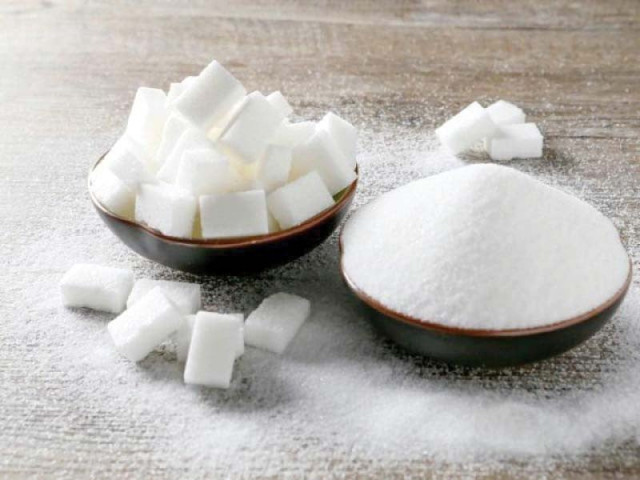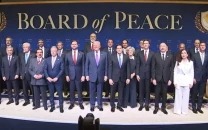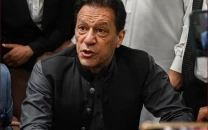ECC allows 100,000 tons of sugar to maintain strategic reserves
Cabinet body extends PM’s package of subsidy on essential food items

The government on Monday approved the import of 100,000 metric tons of sugar that would cost consumers at least Rs104 per kilogramme, and gave a temporary third extension to Prime Minister’s relief package to provide essential food items at subsidised rates.
Against Rs50 billion PM’s Covid package announced in April last year for the Utility Stores Corporation (USC) to provide five essential items, only Rs7.7 billion has so far been provided for spending, indicating a gap between political promises and actual delivery on the ground.
Headed by Finance Minister Shaukat Tarin, the Economic Coordination Committee (ECC) of the Cabinet also deferred many critical summaries like setting up minimum cotton intervention price, tobacco prices and the payment of net hydel profit to the provinces.
The ECC approved a summary by the Industries and Production Division for approval of a tender opened on June 25, 2021 for import of 100,000 metric tons of sugar, said the finance ministry after the meeting. The ECC approved the import of sugar at $526.8 per metric ton.
The cost calculated by the Trading Corporation of Pakistan (TCP) at port comes to Rs89.26 per kg, which after adding transportation, packing and operational charges, will rise to approximately Rs104 per kg as against current retail market price of Rs98 per kg, the ECC was informed.
In January this year, the ECC had allowed import of 500,000 metric tons of sugar despite bumper sugarcane crop. About 2.5 million metric tons sugar was available in the country after offtake of 3.3 million tons as of June 24.
“The estimated sugar stocks by mid-November 2021 will be 200,000 metric tons, which are too low to maintain price stability in the domestic market”, the industries ministry said.
The National Price Monitoring Committee had directed the industries ministry to seek approval for the import of another 250,000 to 300,000 metric tons of sugar for maintaining the strategic reserves.
USC subsidy
On a summary about extension of the general subsidy on five essential items through the USC from July 1, for six months, “the ECC allowed extension in subsidies for 15 days from 1st July and constituted a committee to work out future course of action”, according to the finance ministry.
Read more: Farmers reject new Sugar Act
Under the PM’s relief package, the USC was providing five essential items – wheat flour, ghee, sugar, rice and pulses – to the consumers at subsidised rates since January 2020. However, the package has remained grossly underfunded.
The PM’s USC package had been offered till June last year but due to the USC failure to utilise the funds and low allocations by the finance ministry, it was extended till June this year. Now a third extension has been given by the ECC for 15 days. The USC had sought Rs12 billion more to continue the subsidy under the PM’s package for six more months, which the ECC did not approve.
The prime minister had announced Rs50 billion Covid-19 relief package for the USC but the actual spending in one-and-a-half years remained at Rs7.7 billion, the summary of the industries ministry showed. Since Dec 2019, the USC had been given Rs18 billion subsidies, including Rs7.7 billion under the PM’s package.
Cotton price
Regarding the proposal for intervention price for cotton for 2021-22 crop by the National Food and Research Division, the ECC constituted a committee to submit its report within 15 days, according to the finance ministry.
The food ministry had requested the ECC to set the minimum intervention price at Rs5,000 per 40 kg cotton seed. The cotton production has dropped to just below 7 million bales during the third year of the PTI government, mainly due to decline in crop cultivation area in Punjab and thin profit margins, the ECC was informed.
“Pakistan can potentially produce 20 million bales in 3 to 5 years, if farmers are supported with appropriate technology and ensured a fair price,” the food ministry claimed. Also, the cotton production area and yield increased during the period when the TCP intervened in the market and purchased cotton.
The ECC had also twice rejected the food ministry summaries in 2020, which eventually led to significant drop in the cotton production. In light of the directions given by the ECC in 2020, a ministerial committee consulted with the provinces and a Punjab governor-led committee recommended Rs5,000 as support price and Rs15,000 per-acre grant to the farmers.
The ECC had been sensitised that the cotton sowing had begun and it was high time to announce the wheat intervention price. But the ECC did not immediately take a decision.
The Agriculture Policy Institute has worked out Rs4,406 production cost for Punjab and Rs3,960 for Sindh. It has been proposed that the government will intervene only when the prices fall 10% below Rs5,000 per 40 kg.
The food ministry has recommended the procurement of 2 million cotton bales at Rs5,000 per 40kg of seed cotton and the constitution of a cotton price review committee to make interventions in the market.
The ECC also did not take a decision on a summary to notify minimum indicative price of tobacco crop to support the farmers. The food ministry had requested the ECC to set Rs214.7 per kg price of flu-cured Virginia in plain area and Rs243.7 in sub-mountainous area. The new proposed prices of other tobacco verities were in the range of Rs123 to Rs188 per kg.
Net hydel profits
On a summary from the Power Division about payment of outstanding amount of net hydel profits, the ECC directed the Power Division and Finance Division to come up with a possible solution or option for raising up the required financing by Wapda, within two weeks.
It was the second time that the ECC did not take a decision on the issue of the net hydel profit in one month. On June 2, Tarin had chaired a meeting to resolve the issue and it was conveyed to the Prime Minister’s Office that the “Power Division will move a summary for seeking approval of bank financing of around Rs20-25 billion with the government of Pakistan guarantee. The Finance Division will support the summary in the ECC”.
The hydel profit is built into electricity payments and the Nepra has also recently allowed Rs11 billion mark-up recovery to Wapda on the loans taken in the past to pay off the money to Punjab and Khyber Pakhtunkhwa.
FO grant
The ECC approved supplementary grant of Rs2 billion for the Foreign Affairs Division. The Foreign Office informed the ECC that it was facing Rs2.5 billion shortfall in funds which would affect payment of salaries, education subsidy, medical charges and mandatory contributions to regional and international organisations.
The original budget of the foreign affairs ministry was Rs21.8 billion for the outgoing fiscal year. The ministry said that its allocations were reduced due to devaluation of the rupee against other world currencies. The ECC approved supplementary grant of Rs1 billion for payment of Disparity Reduction Allowance to offices concerned.
The cabinet body approved Rs8 billion for payment to textile exporters. The ready-for-payment claims of the textile and non-textile schemes amounted to Rs33 billion as of March-end, the ECC was informed.
The ECC, on a summary from the Maritime Affairs Division, directed the Petroleum Division, Finance Division and the Pakistan State Oil (PSO) to provide a timeframe for the payment of the outstanding dues to the Pakistan National Shipping Corporation (PNSC).
The PNSC transported 485 cargoes from December 2012 to December 2018. The shipping corporation is seeking recovery of Rs3.4 billion from the PSO, including Rs860 million interest on unpaid amount. The ECC was informed that the PSO was refusing to provide a firm commitment to clear its liabilities.



















COMMENTS
Comments are moderated and generally will be posted if they are on-topic and not abusive.
For more information, please see our Comments FAQ